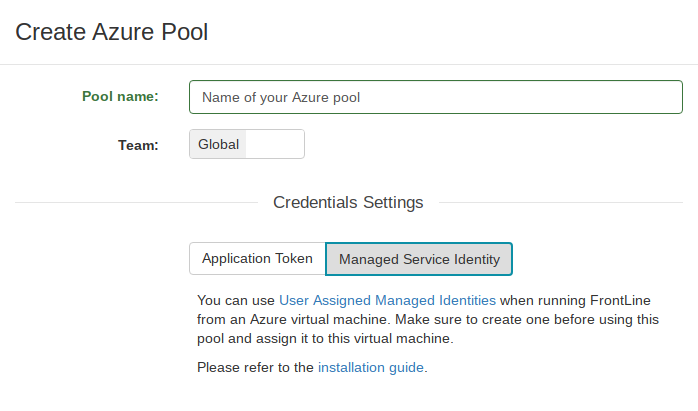Azure
Learn how to configure Azure injectors for Gatling Enterprise.
A Microsoft Azure Pool is a reference to the Azure account you can use to spawn injectors to run the simulation. Only Linux virtual machines are supported.
Make sure your network and firewall configuration will let Gatling Enterprise connect to:
- your injectors on port 22 (SSH) and 9999 (HTTP);
- the Microsoft and Azure REST API:
https://login.microsoftonline.com(Azure IAM)https://management.azure.com(Azure REST API)http://169.254.169.254(Azure IMDS)
To configure the type of instances you want to spawn, you need to fill the form below:

- Team: Set if the pool is global or owned by a team
- Subscription ID: the Azure subscription you want to use, check this article to learn how to retrieve it
- Application ID: the id of the Azure application you want to authenticate with
- Directory ID: the Azure directory you want to use
- Client Secret: the key used to authenticate
- Region: the region where you want to spawn your instances
- Size: the size of the instances
- Network: the network configured on your Microsoft Azure account you want to use
- Subnet: the subnet you want to use
- Connect to private IP: Gatling Enterprise will connect to the injectors’ private IP instead of the public one. If unchecked, the private IP remains a fallback if a public IP is missing. This option should be used only when the Gatling Enterprise host and the injector are both in the same Azure network.
- Image location (certified): select the certified image you want to use for your instances.
- Image location (custom): the Resource Id of the custom image in your Compute Gallery you want to use for your instances. VHD URL are supported, but Azure documentation suggests to use galleries.
A custom image must meet those requirements:
- It must be a generalized image
- JDK8+ installed
- A configured key pair without password
- Port 22 and port 9999 should be open
Refer to Azure documentation to learn more about creating and storing a generalized image:
-
Public Key: the public ssh key to connect to your instances
Ed25519 keys are not supported in Azure. -
Username: the username used by your ssh command to connect to the instances
Azure has some requirements about the username:
- It must be less than 20 characters
- It cannot end with a period (
.) - Many usernames are forbidden, such as
adminandroot
Check the Azure documentation for all the details.
-
Private Key: the previously added private key associated with the public ssh key
It’s also possible to use User Assigned Managed Identities, refer to the installation guide if you want to create a Managed Identity:


